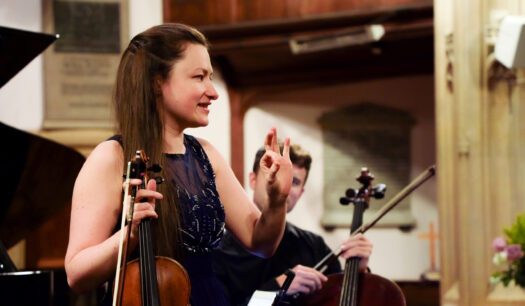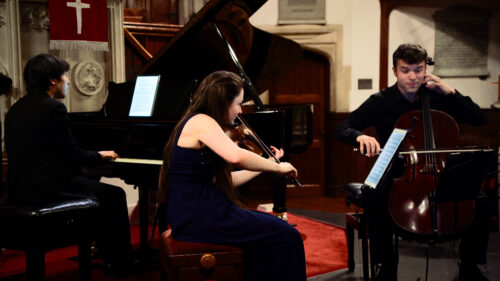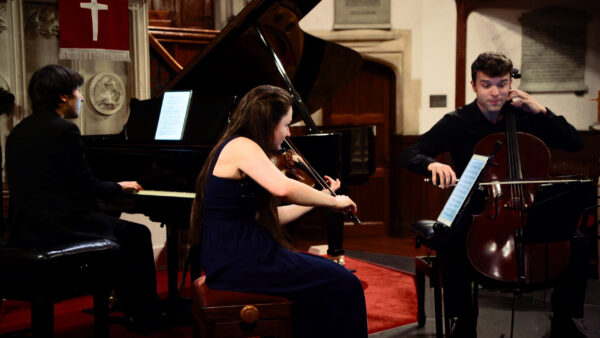 United Kingdom Romsey Chamber Music Festival – WinterFest 2025: Laura Rickard (violin), Rainer Crosett (cello), Tomoki Park (piano). United Reformed Church, Romsey, 17-19.1.2025. (CK)
United Kingdom Romsey Chamber Music Festival – WinterFest 2025: Laura Rickard (violin), Rainer Crosett (cello), Tomoki Park (piano). United Reformed Church, Romsey, 17-19.1.2025. (CK)

Mel Bonis – Soir et Matin, Op.76
Penderecki – Divertimento for Solo Cello
Dvořák – Bagatelles, Op.47
Beethoven – Piano Trio in C minor, Op.1/3
It says a great deal about Laura Rickard’s innovative energy, and the loyalty of her audience, that so many people came out in a cold January to this weekend of typically wide-ranging and exploratory music-making. We all know by now that first-class musicianship and a rewarding voyage of discovery are guaranteed. We should not forget, either, that for Laura and her friends Rainer Crosett (cello) and pianist Tomoki Park these concerts came at the end of a busy week in local Primary Schools teaching 4- to 11-year-olds: at least as demanding, I would have thought, as teaching their regular conservatoire students. As Laura made passionately clear before Sunday’s concert, UK Arts funding has been cut to the bone: ‘we can’t do more music for less money.’ How vital, then, that Laura and others like her are prepared to do the less glamorous work of teaching and inspiring youngsters, embedding in them an appreciation of music and of the role it can play in their lives as future musicians and audiences.
Another attraction of the WinterFest is that we get a look at the menu for the main Summer Festival (31 May – 8 June). And Laura has done it again. After festivals themed around Amitié and Of Love and Madness, this year’s will be entitled Coda. Not just music about death, she reassured us: music about endings, music written sub specie aeternitate, music that celebrates the human spirit in dark places. From Hildegard of Bingen to Gavin Bryars’s haunting Jesus’ Blood Never Failed Me Yet (in Romsey Abbey); from Messiaen’s Quartet for the End of Time, written in a concentration camp, to George Crumb’s post-Vietnam Black Angels; well-loved classics such as Barber’s Adagio, Schubert’s Quartet Death and the Maiden, Richard Strauss’s Four Last Songs and Beethoven’s String Quartet Op.132, with its wonderful hymn of thanksgiving for the composer’s recovery from serious illness.
There is much more, but I must mention the prospect of two solo performances of thrilling virtuosity: Junyan Chen will play Liszt’s monumental Piano Sonata in B minor, and – a real rarity, for obvious reasons – Festival veteran Luke Hsu will take on Paganini’s 24 Caprices – complete! Enough fireworks to burn the place down. If you love music and your ears are open, between 31 May and 8 June Romsey would be a good place to be. For information click here.
Laura’s programming for this first WinterFest concert was typically bold. I had never heard of the French Late Romantic composer Mel Bonis: but on the evidence of Soir et Matin’s passionate surges, its twining lines for violin and cello and its rippling piano figurations her music is sumptuous, perfumed, melting almost to the point of indecency. It was played with relish.
We all have our blind spots, and Penderecki is one of mine. I once heard him conduct his St Luke Passion; his avant-garde box of tricks did not impress me. If anyone can make me warm to his music, Rainer Crosett can. He assured us that the Divertimento for Solo Cello – a late piece – is simpler and more tonal than his earlier music, with ‘a whole range of expressive possibilities for the cello’. Cue pizzicato, col legno and whatnot. The concluding Notturno did provide some simpler lyricism. Very characterful music, said Rainer; astonishingly skilful and characterful playing, certainly.
It was a splendid idea to invite Rose Gosney, a local violinist who made a great impression in the 2024 Festival masterclass (and who has lately been Leader of the National Youth Orchestra), to join the onstage trio for a performance of Dvořák’s folky Bagatelles. They were charmingly played; all I wrote in my notebook was ‘I love Dvořák! His music always opens a window and lets fresh air in.’

To finish, very early Beethoven: in his amusing introduction Tomoki remarked that the fiendishly difficult piano part in the Piano Trio Op.1/3 is evidence of how great a pianist the composer was! The opening Allegro con brio is music of characteristically decisive, dramatic gestures, the restless piano part seeming to anticipate the finale of the Tempest Sonata, Op.31/2. The playing here was fiercely committed. The ensuing Andante cantabile was contrastingly graceful; I particularly liked the variation in which the violin and cello alternated in rather wistful phrases. The final Prestissimo took no prisoners, with a fearsome piano part: the first thing Laura and Rainer did after the unexpected close was to pat Tomoki on the shoulder.
There was an engrossing masterclass between this concert and the next. Esther Chan (piano), Laila Tabayashi (violin) and Jemima Hughes (cello) played the first movement of Clara Schumann’s lovely Piano Trio in G minor; concentrating on a short passage from it, Tomoki Park guided and encouraged them in their progress from competent instrumentalists to effective chamber musicians. Ellen Baumring-Gledhill (cello) and Dafydd Chapman (piano) gave an impressively committed performance of the first movement of Prokofiev’s Cello Sonata; with Rainer Crosett’s gentle but focused coaching they were able to work on the expressivity of their playing together.
Ravel – Sonata for Violin and Cello, M.73
Joseph Phibbs – Sonata for Violin and Piano
Bach – Duetto No.2 in F major, BWV 803
Katherine Balch – Obstenmelodie (UK Premiere)
Robert Schumann – Piano Trio in D minor, Op.63
In a weekend of remarkable performances, Laura and Rainer’s Ravel Sonata for Violin and Cello was perhaps the most remarkable of all. It would need someone with more technical knowledge than I possess to do justice to the music and to their playing. Pared back and propulsive, it takes us on an extraordinary journey. The spare instrumental lines of the opening Allegro weave in and out of each other with attractively pastoral effect; in the second movement, Très vif, the vigorous pizzicatos and chugging rhythms have an alla zingarese flavour. The third movement, Lent, is the heart of the piece: angular but beautiful, it reaches passionate heights – and depths – depicting them in bare outline rather than in full dress, before returning to earth and ending on a bare fifth. The high-spirited concluding Vif, with its white-knuckle swerves of tempo, rhythm and dynamics, brought such vivid and committed playing from Laura and Rainer that one could only gasp. It is a piece that demands courage as well as superb skill, and it got both!
Joseph Phibbs’s Sonata for Violin and Piano, Laura told us, was commissioned by the Presteigne Festival. Its 2020 premiere took place online due to Coronavirus: shadowed by the pandemic, it is, in Laura’s words, ‘quite a melancholic and pensive piece, but with a sense of light emerging from the shadows’. In four short movements, it spins, rather hypnotically, a glacial soundworld of its own, music etched on silence: piano notes like frozen droplets in the Prelude, Laura’s isolated strokes in Blues like shards of ice, alternating with harsh pizzicatos; brittle, scurrying music for both players in Nocturne. Tomoki’s playing was confined almost exclusively to the upper octaves of the keyboard. Icy sounds to finish.
Tomoki – pupil of Peter Serkin, protégé of Sir András Schiff – ended the concert’s first half by reaffirming Laura’s commitment to contemporary music and following Bach’s Duetto No.2 in F major with the UK premiere of Obstenmelodie, dedicated to him by the American composer Katherine Balch, and designed as a companion-piece to the Bach. Their connection is hard to discern by a layman on a single hearing. After the fluently played intricacies of the Duetto Obstenmelodie sounded fractured, nervous; rather than duetting the hands became dramatically polarised; when they met in the middle there were fireworks. The ending was subdued, as though both hands had agreed to call it a day.
Robert Schumann’s Piano Trio in D minor proved a wonderful finale to the Festival. The extended opening movement had all the energy and passion that Schumann asks for; the otherworldly episode where the violin and cello play quietly sul ponticello over the piano’s elfin chiming was magical indeed. The second movement had great rhythmic drive; Tomoki’s playing was so sensitive and idiomatic that we could almost see him as the composer himself. Laura’s desolate phrases in the slow movement were most affecting, as was the subdued gravity and flexibility of Rainer’s playing. The finale – ‘with fire’, instructs Schumann – brought full-hearted playing, and a full-hearted response from a delighted audience.
Roll on the Summer Festival!
Chris Kettle
